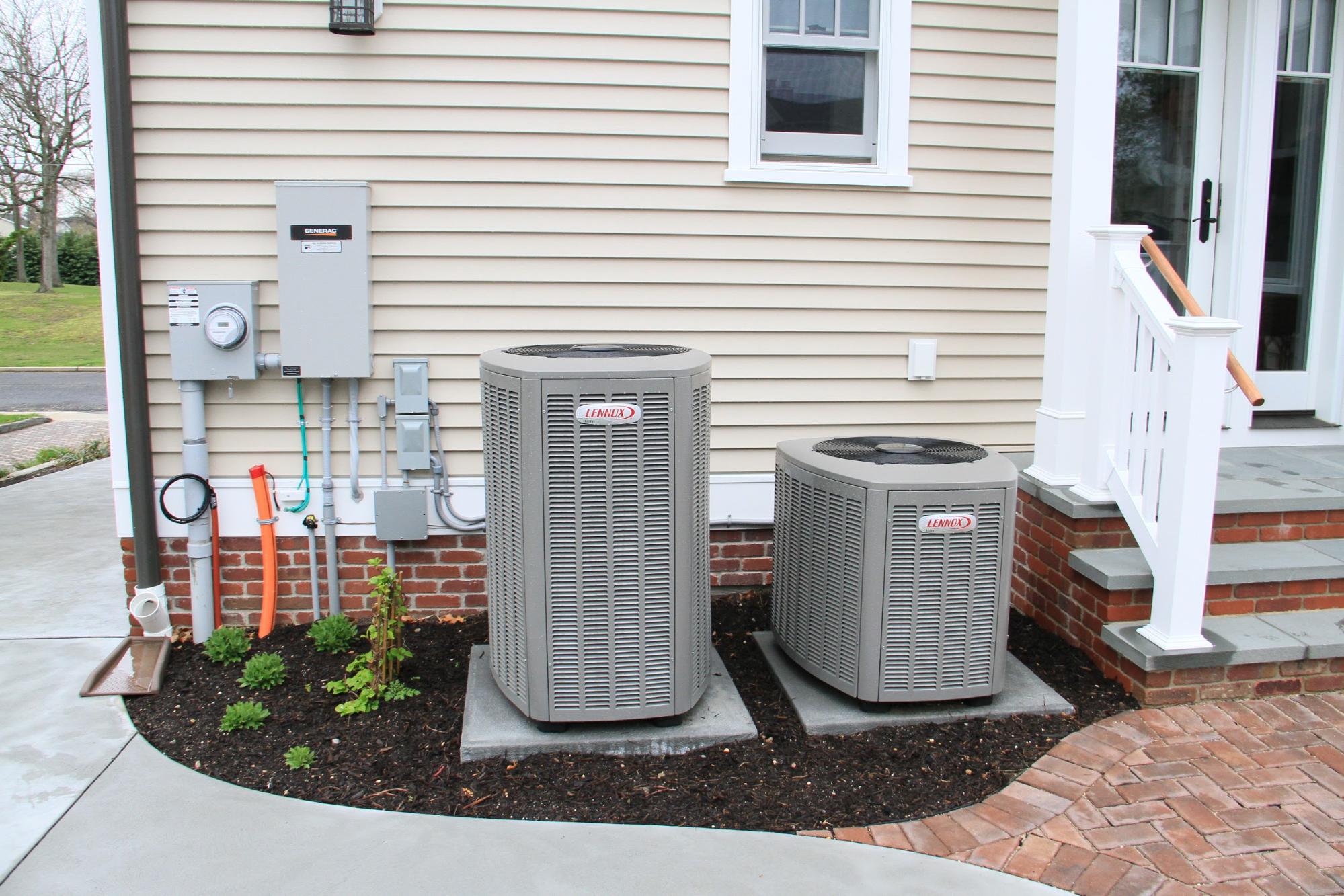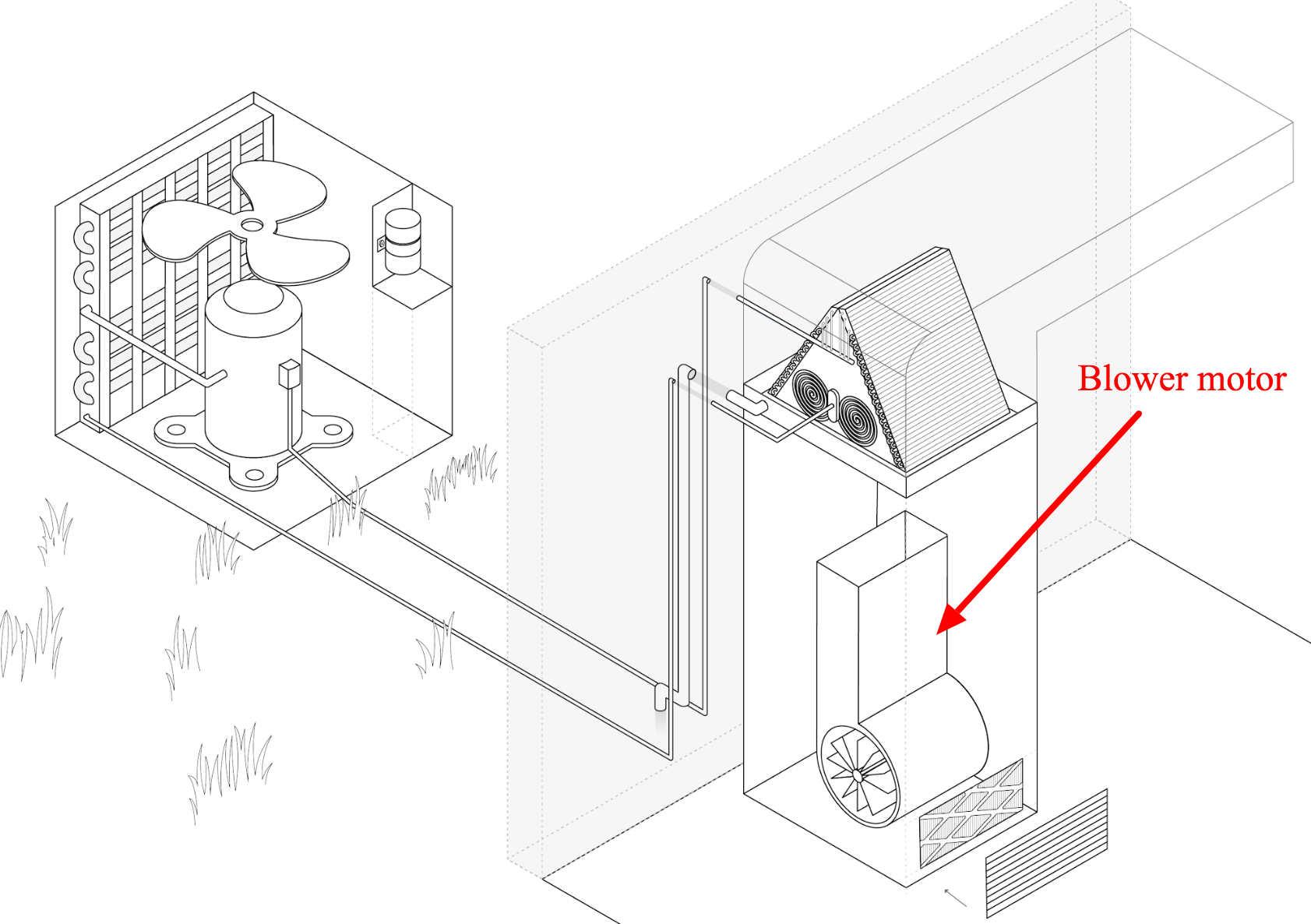What's the Cost to Replace an HVAC Blower Motor in New Jersey?
November 11, 2024

The cost to replace an HVAC blower motor in New Jersey ranges from $500 to $1,800+.
We know—that’s a pretty broad range.
But we can tell you that your blower motor replacement cost is determined by these 3 factors:
- The size of your AC/furnace
- The kind of blower motor you have
- The professional you choose
We’ll explain those 3 factors and how they affect pricing. But first, let’s take a quick look at how your blower motor works and where it’s located in your HVAC system.
Blower motor 101: What it does and where it’s located
First things first: If you have a central AC (or heat pump) paired with a furnace, your blower motor is shared between the two systems.
You see, both your central cooling and heating systems rely on a blower motor to:
- Pull unconditioned air into the HVAC system
- Push cool air out into the home

Image of a blower motor as it relates to the air conditioner. In the summer, the blower motor pushes cold air into your home, in the winter it pushes warm air into your home.
So, if you’ve been told that your furnace blower motor is bad, that means your central AC blower motor is also bad. The good news, though, is that you’re technically getting two HVAC repairs for the price of one.
Speaking of price, let’s take a closer look at what factors will increase or decrease your HVAC blower motor replacement.
3 factors that affect the cost of an HVAC blower motor
Cost factor #1: The size of your AC/furnace
The “larger” your AC and furnace, the more expensive your blower motor replacement will be.
But here’s the thing: When we talk about the size of HVAC systems, we’re not talking about physical dimensions. Instead, we’re talking about how much cold or hot air it can provide in a specific time.
And that makes sense, right? An AC that provides more cool air would need a stronger blower motor than a smaller AC that pushes out less cold air given the same timeframe.
So how do you know what size AC and furnace you have? Well, first it’s helpful to understand that ACs and furnaces are measured in “BTUs” (British Thermal Units).
BTUs are a measurement of heat, which means:
- ACs are measured by how much heat they remove from a home in a given time. Residential ACs range from 12,000 to 60,000 BTUs.
- Furnaces are measured by how much heat they provide to a home in a given time. Residential furnaces range from 40,000 to 120,000 BTUs.
Note: You may also see ACs sized in “tonnage”. One AC “ton” is equal to 12,000 BTUs. Ex. a 4-ton AC has a 48,000 BTU output.
Not sure how many BTUs your AC or furnace have? Well, sometimes you can find the BTU output on the the name plate located inside the furnace/AC, typically on an energy sticker. Just look for the term “BTU output”.
If you can’t find the sticker, we suggest writing down the model and serial number of your AC/furnace and contacting your local distributor. They’ll be able to look up your model and determine its size/BTU output.
Cost factor #2: The kind of blower motor you have
There are 3 different kinds of blower motors. We’ve listed these 3 types below from most to least expensive:
- Single-speed
- Multi-speed
- Variable-speed
So what’s the difference between these types of blower motors? Well it all comes down to how many speeds the motor has:
- A single-speed blower motor can only run on 1 speed: HIGH
- A multi-speed blower motor can alternate between 3 speeds: HIGH, MEDIUM and LOW
- A variable-speed blower motor has unlimited speeds. These blower motors can ramp up or down depending on the amount of heating/cooling that’s needed.
The bottom line is that the more speeds a blower motor has, the more efficient it is. For example, a variable-speed blower motor can ramp down to 30% of its energy use if very little heating/cooling is needed. A single-speed blower motor, on the other hand, would still blow at 100% full-blast even when 30% would be adequate.
The important thing to understand here is that whatever blower motor your current system has, that’s the blower motor you’ll need to replace it with. Upgrading or downgrading your blower motor—without changing any other aspects of your system—can lower the efficiency of the system and cause breakdowns.
Cost factor #3: The professional you choose
Higher-quality, licensed and insured professionals will typically charge more than low-quality, uninsured professionals.
But don’t make the mistake of choosing the lower-priced professional—especially if they’re uninsured. Doing so often results in:
- Voiding your HVAC warranty
- Expensive repeat work due to shoddy work
- Being financially responsible for any injuries the tech might incur on your property
Our advice is to choose a professional who:
- Operates under a company that’s licensed
- Operates under a company that’s been in business for 10+ years
- Is insured in the state of New Jersey
- Has plenty of experience in blower motor replacements
- Can offer 2–3 referrals from past customers
- Offers upfront estimates in writing
Need an HVAC blower motor replacement in New Jersey?
We can help. Just contact us and we’ll provide a fair, honest quote after an in-home consultation.
